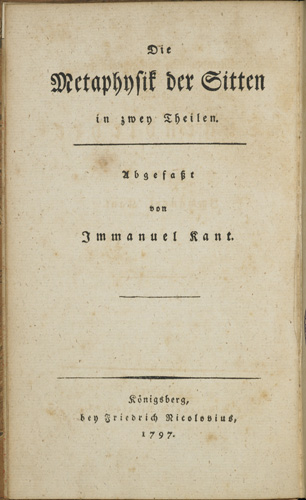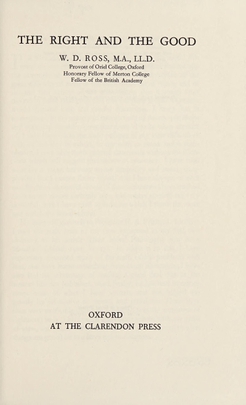A maxim is a moral rule or principle, which can be considered dependent on one's philosophy. A maxim is often pedagogical and motivates specific actions. The Oxford Dictionary of Philosophy defines it as:
Generally any simple and memorable rule or guide for living; for example, 'neither a borrower nor a lender be'. Tennyson speaks of 'a little hoard of maxims preaching down a daughter's heart (Locksley Hall), and maxims have generally been associated with a 'folksy' or 'copy-book' approach to morality. [1]
In deontological ethics, mainly in Kantian ethics, maxims are understood as subjective principles of action. A maxim is thought to be part of an agent's thought process for every rational action, indicating in its standard form: (1) the action, or type of action; (2) the conditions under which it is to be done; and (3) the end or purpose to be achieved by the action, or the motive. The maxim of an action is often referred to as the agent's intention. In Kantian ethics, the categorical imperative provides a test on maxims for determining whether the actions they refer to are right, wrong, or permissible.
The categorical imperative is stated canonically as: "Act only according to that maxim whereby you can, at the same time, will that it should become a universal law." [2]
In his Critique of Practical Reason , Immanuel Kant provided the following example of a maxim and of how to apply the test of the categorical imperative:
I have, for example, made it my maxim to increase my wealth by any safe means. Now I have a deposit in my hands, the owner of which has died and left no record of it. . . . I therefore apply the maxim to the present case and ask whether it could indeed take the form of a law, and consequently whether I could through my maxim at the same time give such a law as this: that everyone may deny a deposit which no one can prove has been made. I at once become aware that such a principle, as a law, would annihilate itself since it would bring it about that there would be no deposits at all. [3]
Also, an action is said to have "moral worth" if the maxim upon which the agent acts cites the purpose of conforming to a moral requirement. That is, a person's action has moral worth when he does his duty purely for the sake of duty, or does the right thing for the right reason. Kant himself believed that it is impossible to know whether anyone's action has ever had moral worth. It might appear to someone that he has acted entirely "from duty", but this could always be an illusion of self-interest: of wanting to see oneself in the best, most noble light. This indicates that agents are not always the best judges of their own maxims or motives.
Michael Polanyi in his account of tacit knowledge stressed the importance of the maxim in focusing both explicit and implicit modes of understanding. "Maxims are rules, the correct application of which is part of the art they govern....Maxims can only function within a framework of personal (i.e., experiential) knowledge". [4]

Immanuel Kant was a German philosopher and one of the central Enlightenment thinkers. Born in Königsberg, Kant's comprehensive and systematic works in epistemology, metaphysics, ethics, and aesthetics have made him one of the most influential and controversial figures in modern Western philosophy, being called the "father of modern ethics", the "father of modern aesthetics", and for bringing together rationalism and empiricism earned the title of "father of modern philosophy".
Normative ethics is the study of ethical behaviour and is the branch of philosophical ethics that investigates questions regarding how one ought to act, in a moral sense.
In ethics and the social sciences, value theory involves various approaches that examine how, why, and to what degree humans value things and whether the object or subject of valuing is a person, idea, object, or anything else. Within philosophy, it is also known as ethics or axiology.
Will, within philosophy, is a faculty of the mind. Will is important as one of the parts of the mind, along with reason and understanding. It is considered central to the field of ethics because of its role in enabling deliberate action.

The categorical imperative is the central philosophical concept in the deontological moral philosophy of Immanuel Kant. Introduced in Kant's 1785 Groundwork of the Metaphysics of Morals, it is a way of evaluating motivations for action. It is best known in its original formulation: "Act only according to that maxim whereby you can at the same time will that it should become a universal law."

Groundwork of the Metaphysics of Morals is the first of Immanuel Kant's mature works on moral philosophy and the first of his trilogy of major works on ethics alongside the Critique of Practical Reason and The Metaphysics of Morals. It remains one of the most influential in the field. Kant conceives his investigation as a work of foundational ethics—one that clears the ground for future research by explaining the core concepts and principles of moral theory, and showing that they are normative for rational agents.
In moral philosophy, deontological ethics or deontology is the normative ethical theory that the morality of an action should be based on whether that action itself is right or wrong under a series of rules and principles, rather than based on the consequences of the action. It is sometimes described as duty-, obligation-, or rule-based ethics. Deontological ethics is commonly contrasted to consequentialism, utilitarianism, virtue ethics, and pragmatic ethics. In this terminology, action is more important than the consequences.

The Critique of Practical Reason is the second of Immanuel Kant's three critiques, published in 1788. Hence, it is sometimes referred to as the "second critique". It follows on from Kant's first critique, the Critique of Pure Reason, and is one of his major works on moral philosophy. While Kant had already published one significant work in moral philosophy, the Groundwork of the Metaphysics of Morals (1785), the Critique of Practical Reason was intended to develop his account of the will as determinable by the moral law alone, place his ethical views within the larger framework of his system of critical philosophy, and expand on certain themes in his moral philosophy such as the feeling of respect for the moral law and the concept of the highest good.

Kantianism is the philosophy of Immanuel Kant, a German philosopher born in Königsberg, Prussia. The term Kantianism or Kantian is sometimes also used to describe contemporary positions in philosophy of mind, epistemology, and ethics.
Rule utilitarianism is a form of utilitarianism that says an action is right as it conforms to a rule that leads to the greatest good, or that "the rightness or wrongness of a particular action is a function of the correctness of the rule of which it is an instance". Philosophers Richard Brandt and Brad Hooker are major proponents of such an approach.

The Metaphysics of Morals is a 1797 work of political and moral philosophy by Immanuel Kant. It is also Kant's last major work in moral philosophy. The work is divided into two sections: the Doctrine of Right, dealing with political rights, and the Doctrine of Virtue, dealing with ethical virtues.
On the Basis of Morality or On the Basis of Morals is one of Arthur Schopenhauer's major works in ethics, in which he argues that morality stems from compassion. Schopenhauer begins with a criticism of Kant's Groundwork of the Metaphysic of Morals, which Schopenhauer considered to be the clearest explanation of Kant's foundation of ethics.

Kantian ethics refers to a deontological ethical theory developed by German philosopher Immanuel Kant that is based on the notion that "I ought never to act except in such a way that I could also will that my maxim should become a universal law.” It is also associated with the idea that “[i]t is impossible to think of anything at all in the world, or indeed even beyond it, that could be considered good without limitation except a good will." The theory was developed in the context of Enlightenment rationalism. It states that an action can only be moral if it is motivated by a sense of duty, and its maxim may be rationally willed a universal, objective law.
Moral rationalism, also called ethical rationalism, is a view in meta-ethics according to which moral principles are knowable a priori, by reason alone. Some prominent figures in the history of philosophy who have defended moral rationalism are Plato and Immanuel Kant. Perhaps the most prominent figure in the history of philosophy who has rejected moral rationalism is David Hume. Recent philosophers who have defended moral rationalism include Richard Hare, Christine Korsgaard, Alan Gewirth, and Michael Smith.
Radical evil is a phrase used by German philosopher Immanuel Kant, one representing the Christian term, radix malorum. Kant believed that human beings naturally have a tendency to be evil. He explains radical evil as corruption that entirely takes over a human being and leads to desires acting against the universal moral law. The outcome of one's natural tendency, or innate propensity, towards evil are actions or "deeds" that subordinate the moral law. According to Kant, these actions oppose universally moral maxims and display self-love and self conceit. By many authors, Kant's concept of radical evil is seen as a paradox and inconsistent through his development of moral theories.

Aristotle defined inclination in the first paragraph of Metaphysics with the statement "all men by their nature, desire to know." Thomas Aquinas proposed that humans have four natural inclinations - a natural inclination to preservation (life), an inclination to sexual reproduction (procreation), sociability, and knowledge. Inclination in the modern philosophy of ethics is viewed in the context of morality, or moral worth.
The general concept or principle of moral universalizability is that moral principles, maxims, norms, facts, predicates, rules, etc., are universally true; that is, if they are true as applied to some particular case then they are true of all other cases of this sort. Some philosophers, like Immanuel Kant, Richard Hare, and Alan Gewirth, have argued that moral universalizability is the foundation of all moral facts. Others have argued that moral universalizability is a necessary, but not a sufficient, test of morality. A few philosophers have also argued that morality is not constrained by universalizability at all.
Mou Zongsan's study of Immanuel Kant has been cited as a highly crucial part in the development Mou’s personal philosophy, namely New Confucianism. Widely regarded as the most influential Kant scholar in China, Mou's rigorous critique of Kant’s philosophy—having translated all three of Kant’s critiques—served as an attempt to reconcile Chinese and Western philosophy whilst increasing pressure to westernize in China.

The Right and the Good is a 1930 book by the Scottish philosopher David Ross. In it, Ross develops a deontological pluralism based on prima facie duties. Ross defends a realist position about morality and an intuitionist position about moral knowledge. The Right and the Good has been praised as one of the most important works of ethical theory in the twentieth century.

Ethical idealism, which is also referred to by terms such as moral idealism, principled idealism, and other expressions, is a philosophical framework based on holding onto specifically defined ideals in the context of facing various consequences to holding such principles and/or values. Such ideals, which are analyzed during the process of ethical thinking, become applied in practice via a group of specific goals relative to what has been learned over time about morality. As noted by philosopher Norbert Paulo, following ideals in a doctrinaire fashion will "exceed obligations" put on people such that actions "are warranted, but not strictly required."